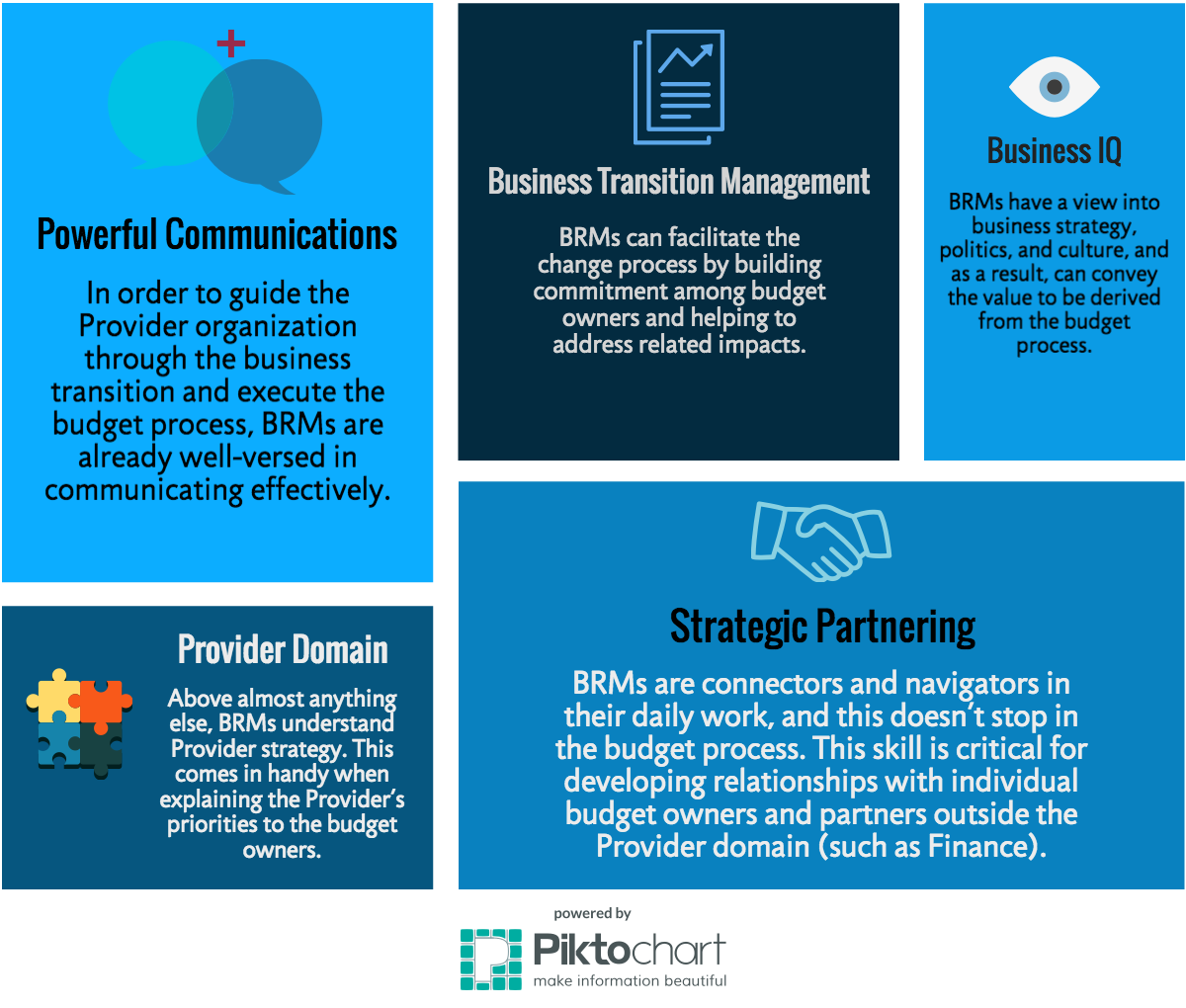BRM Council Corner: Bringing Your BRM Skills to the Budgeting Process
When you’re asked to step outside of your comfort zone, it makes sense to feel uncertain, especially in times of change. Learn how your BRM skills can take you further than you realize.
We all know how easy it is to feel comfortable when things are stable, but we’re also well aware that comfort doesn’t typically lead to growth. Before Discount Tire began working through big changes in 2015, I had never realized how transferable my BRM skills were—and how intimidating it can be when it finally comes time to step up to the challenge.
At the time, we were just beginning to learn how to take advantage of our brand new ERP implementation, which had replaced our custom-built financial applications, among other things. Secondly, we were in the midst of welcoming a new CIO. Unlike most of our executives, our new CIO hadn’t grown up at Discount Tire, meaning that his experience at publicly-held companies brought new insights and expectations to our privately-held organization.
I had no background in Finance! Shouldn’t we have someone dedicated to IT Finance? Wasn’t there someone more experienced with IT budgeting who would be better suited to lead this effort?
One change led to another, ultimately driving the desire to implement yet another—this one in the form of a Budgeting Process. Before I knew it, not only had the new CIO eagerly volunteered IT to be the guinea pig, but as the Business Relationship Owner (BRO) for IT, I was asked to lead the budgeting process.
Naturally, I initially had no idea how this fit in with the BRM role. As is typical of most BRMs, my experience had prepared me for discussions about solutions and data architecture, business case development, value management…even software development. My thoughts were spinning. I had no background in Finance! Shouldn’t we have someone dedicated to IT Finance? Wasn’t there someone more experienced with IT budgeting who would be better suited to lead this effort?
If you’ve ever been faced with a challenge outside of your BRM comfort zone, this article is for you——and the skills you may not even know you have.
Although BRMs are often positioned to optimize value for business and IT, the value of the BRM capability doesn’t end there. As I mulled my new challenge over, I contemplated the skills and core competencies that BRMs bring to the budget process.

As a result of these skills and competencies, here are some points of success for the BRM leading the budgeting process, regardless of outcome:
- A financial view of strategy
- The ability to influence implementation of Provider strategy roadmap components
- Building and strengthening relationships both inside and outside your Provider organization
- Serving as a Connector between the Provider and Finance
- The ability to drive value management for your Provider
- Holding an additional perspective on strategy
- Having a deep understanding of your Provider portfolio
- Improving portfolio planning across the organization
- Gaining a better understanding of the “whys” of Finance questions
- Improving financial transparency between the Provider and other business partners
Not only can a BRM leading the budget process bring your Provider organization and company significant value due to the aforementioned skills, there is an additional outcome of the benefits listed above that is indirectly related to the budget process itself. By understanding the “whys” of Finance questions, BRMs can provide answers before the questions are even asked, leading to a perceived increase in transparency between the two organizations. This transparency, whether real or perceived, increases the level of trust and speed between the two in a larger context as well—and what better value can a BRM bring than moving ideas to value faster?
Do you know where you stand with your BRM skills and competencies? If you haven’t taken a close look and reflected on your skill development recently, perhaps it’s time.
By understanding the “whys” of Finance questions, BRMs can provide answers before the questions are even asked, leading to a perceived increase in transparency between the two organizations.
A sense of self-reflection and awareness is crucial for success in any position, but for BRMs, it’s the difference between stagnating and understanding where the business and Provider organization are going—and envisioning yourself in that future context.
There are many tools available to help develop or sharpen these skills, including:
- BRMP® Certification
- CBRM® Certification
- Publications for Developing BRM Competencies, provided in the BRMiBOK
Not only does being proactive with skill development help ensure that you earn and maintain your seat at the strategy table, but it poises you to meet challenges head-on. The next time your CIO asks you to do something outside of your comfort zone, think about the skills that have gotten you this far before assuming you’re not the best person for the job—because chances are, those skills can take you even further.
Deryl Heitman has been a Business Relationship Owner (BRO) at Discount Tire since October 2013. Over his 16+ years with Discount Tire, he has served in a variety of positions within IT including Solutions Architect, Data Architect, and Software Development Manager. Through these opportunities, Deryl has established himself as a trusted expert with the ability to communicate complex technical issues to a wide variety of audiences from executives to delivery teams. Prior to Discount Tire, he held positions at Lockheed Martin, World Access Service Corporation, Virginia Mutual Insurance Company, and the United States Air Force. Deryl holds certifications in Enterprise Architecture, Service Oriented Architecture, ITIL Service Management, and most recently, Business Relationship Management.
Great article! I have had similar experiences myself. The importance of asking the question of “why” is crucial. Not only does that help you collect the facts, but I find that learning the “back story” is the fun part for these types of projects!